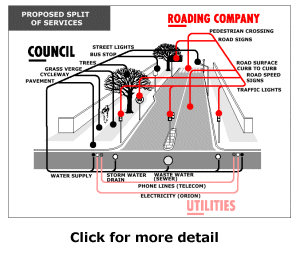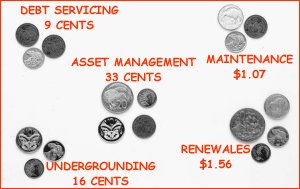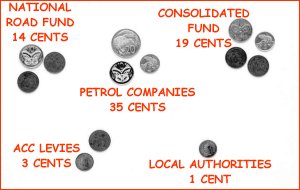| Profit-Taking Companines Set to Take Over Christchurch Roads |
If the Government’s roading proposals become law, four to eight commercial roading companies would be set up throughout the country to manage all local roads. The reforms would have the following consequences:
- Responsibility for managing the roads would be removed from the local community to a commercial company - one not directly controlled by the people of Christchurch.
- This split would leave the Council responsible for some activities on the road and the new commercial company responsible for others (see illustration), making any co- ordinated approach very complicated.
- Along with the other commercial roading companies which are formed nationwide, and which would be among the largest companies in the country, this commercial company would be required to make a profit from our roads.
- Petrol and road freight prices would increase, which would have a flow-on effect to the price of many other things which are transported into our region.
- Management of parking in Christchurch would be spilt between the commercial roading company, which would be responsible for on- street parking, and the City Council, which would continue to be responsible for off- street parking. This would make effective planning to regenerate retail activity in the City Centre much more complicated than it currently is, and would make central Christchurch an increasingly unattractive place to shop and set up a business.
|
 |
Community Control on the Line
|
If the Government proceeds with its plans to reform our system of roads, some people would be better off financially, while others would suffer. This is only part of the picture as communities would no longer directly control what happens to their ‘own’ roads. Christchurch has around 1,500 km of local roads, some 140 bridges, associated kerbs channels and footpaths, 30,000 streetlights, approximately the same number of street signs and 140 km of cycle- ways. These roads are owned by the Christchurch community. They are managed and maintained on behalf of the community by the Christchurch City Council. The average price of this service to each Christchurch residential ratepayer is around $3.20 per week. Under the Government’s proposed reforms a small number of large profit- making companies would be handed all New Zealand roads to manage. The company
which would manage Christchurch roads would not be directly controlled by the Christchurch community. Christchurch would have such a small shareholding in this company that we would be unable to greatly influence the company. When the company was first formed Christchurch City Council would have no rights to directly appoint members of its board. Board members would instead be appointed by a Government commission.
|
Even if we were lucky enough to have one or two Christchurch people sitting on this board, theirs would be a lone voice among many when decisions about the roads in our City are made. They would also be motivated by one thing above all others when it comes to making decisions about our roads — "Will this road provide our company with a commercial return or not?" This is in contrast to the current situation where, as the manager of local roads, Christchurch City Council is democratically accountable to Christchurch people. This company would also probably manage all other roads in the South Island - except state highways. Therefore the needs of Christchurch would be competing around the board table with the needs of Invercargill, Nelson, Dunedin, Kaikoura, the West Coast and all the other South Island towns and cities. All these places have very different expectations and requirements of their roads. Generally it makes sense for Christchurch people - and those in these other communities - to make their own decisions about their own roads. When making these decisions it also makes sense for communities to be able to give proper weight to other issues, such as the environment, road safety and the vital role transport plays in everyday life - not just the dollar.
|
| How are Our Rates Spent on Our Roads |
Each Christchurch residential ratepayer spends an average of around $16.28 per week in rates. Of this 19.8%, or $3.22 is used to maintain our City’s streets. This is divided into five different general activities as follows:
- Asset management includes planning and safety management issues
- Maintenance includes general road repairs, cleaning, mowing the verges, etc
- Renewals includes reconstruction, kerb and channel replacement and resealing
|
| Where do Our Petrol Costs go |
When you buy petrol, only a proportion of it actually pays for the petrol. Some is also used to build and maintain our roads, and the rest goes as a general tax to the Government. For example, when you pay 81 cents for a litre of unleaded 91 petrol, the cost is split as follows:
- Petrol companies includes the actual cost of the petrol and any profit made by the service station or petrol company
- Consolidated fund is used by the Government for education, defence, social security, health etc
- Local Authorities petroleum tax of .66c per litre - paid to local authorities
- National Roads Fund - distributed by Transfund to Transit and local authorities for roading expenditure
|


